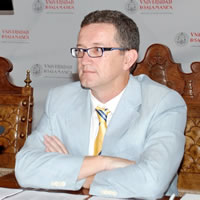Exploring phonological resemblances between languages of different genetic origin in roughly the same geographical area will not lead us to counter-propose a different genetic affiliation. The idea is that all or most of them have replaced former languages existing in their respective areas. Language shift, necessarily, results in the incorporation of a few traits from the language replaced into the new one replacing it. This substratum phenomenon is well known in the context of language shift and has been extensively researched. When and if we are able to identify specific linguistic traits (the more specific the better) that imply neat and significant divergence between particular languages and other languages of their respective families, it could be indicative that these traits in particular were triggered by some characteristics of the languages they geographically replaced. If more than one language group in the same geographical area share some of these traits, there is a greater possibility that something discernible relating to the replaced language of that area has been left behind and that we might be able to glean indirect information about some of the characteristics of the language(s) once spoken there and later replaced. In this presentation we will be exploring how the effects of the shift to Proto-Celtic from an unknown pre-Indo-European language (or languages) could have affected Proto-Celtic, and also how the shift to late Latin from various Celtic dialects could have affected Western Romance languages. We also aim to demonstrate how the substratum phenomenon could have implications about our views concerning the historical geographic position of different languages; Basque, for example – or lost languages with phonetic similarities to Basque, not necessarily genetically related to it – sharing borders with Celtic, Lusitanian, Italic and other languages or language groups (even Germanic?).

Mae Juan-Luis wedi bod yn Athro Groeg yn Adran Ieitheg Glasurol Prifysgol Salamanca er 2002. Mae hefyd wedi ysgwyddo amrywiol gyfrifoldebau eraill yn Salamanca, yn eu plith Ysgrifennydd Academaidd y Gyfadran Ieitheg (2004–2010), Is-Ddeon Cysylltiadau Rhyngwladol a Chydlynydd Erasmus y Gyfadran Ieitheg (2010–2012) a Chyfarwyddwr y Ganolfan Addysg Barhaus (2014–2018). Yn ystod blynyddoedd cynnar ei yrfa bu’n ysgolor ar ymweliad ac ymchwilydd mewn nifer o brifysgolion, gan gynnwys Coleg y Drindod Dulyn (1988–9), lle dechreuodd ymchwilio i’r ieithoedd Celtaidd, Rhydychen (1991–6) a Harvard (1991–4), dau sefydliad lle gosodwyd sylfeini ei draethawd PhD a lle cafodd ei brofiad cyntaf o ymchwil ôl-ddoethuriaethol. Dyfarnwyd iddo radd PhD (Salamanca, 1993) mewn Ieitheg Glasurol ac Ieithyddiaeth Indo-Ewropeaidd ac mae ei ymchwil yn parhau i gael ei ysbrydoli gan ddulliau rhyngddisgyblaethol cadarn. Ac yntau’n ysgolhaig ym maes yr Ieithoedd Indo-Ewropeaidd Hynafol (yn arbennig Celtibereg), bu i onomasteg ran ganolog yn ei ymchwil ieithyddol ac arweiniodd hynny at ymwneud â meysydd eraill megis Archeoleg, Hen Hanes a Hanes Gwyddoniaeth. Yn sgil ei waith ar Claudius Ptolemy y mae wedi magu diddordeb yng ngwybodaeth y Groegwyr gynt am ddaearyddiaeth ac astronomeg ac yn y modd yr adlewyrchir hynny mewn llenyddiaeth, yn ogystal ag yn addysg ac ymchwil gwyddonol Y Dwyrain Groegaidd. Ymhlith ei gyhoeddiadau y mae La Península Ibérica en la Geografía de Claudio Ptolomeo (Vitoria, 2003) a’r cyfrolau canlynol a olygwyd ganddo, Continental Celtic Word Formation: Onomastic Data (Salamanca, 2013) a Celtic and Other Languages in Ancient Europe (Salamanca, 2008). Un o’i gyhoeddiadau mwyaf diweddar yw ‘La soledad del vasco’ a ymddangosodd yn Studia Philologica et Diachronica in Honorem Joaquin Gorrochategui. Indoeuropaea et Palaeohispanica, José María Vallejo, Iván Igartúa y Carlos García Castillejo (goln.), Anejos de Veleia Minor, 35 (Vitoria, 2018), 127–146. Ar hyn o bryd, Juan-Luis yw Prif Ymchwilydd y prosiect Erasmus+ KA2 CBHE XCELING (Tuag at Ragoriaeth mewn Ieithyddiaeth Gymwysiedig), 2017–2020, ac er 2012 y mae wedi bod yn aelod o Fwrdd Golygyddol y cyfnodolyn Minos.